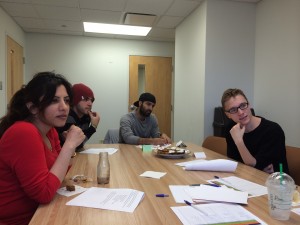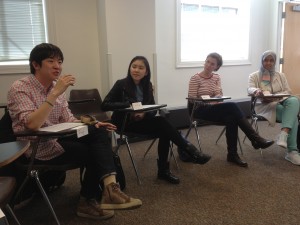With Spring Quarter underway, the CMWR has been busy as ever! In case you couldn’t make it to some of our events in the last few weeks, here’s what you missed.
* * * * * *
 Are you a DePaul student? Did you fall in love with deep dish pizza? Or a Chicago Dog/Chicago Red Hot? If you are an English learner, did you start missing a vowel pronouncing dawn as don? If you answered yes to any these questions it’s time to check how far midwesternized you have become, and now much you know about Illinois, the state you are currently living in.
Are you a DePaul student? Did you fall in love with deep dish pizza? Or a Chicago Dog/Chicago Red Hot? If you are an English learner, did you start missing a vowel pronouncing dawn as don? If you answered yes to any these questions it’s time to check how far midwesternized you have become, and now much you know about Illinois, the state you are currently living in.
On 4/25, Conversation & Culture offered our attendees to test how well they know life of the state where their school is located, the life beyond DePaul settings, and the City of Chicago. Another, linguistic, inquiry in what the word Illinois means also brought a variety of answers, many very far from correct, as hardly any of us now would be able to refer it to Algonquin language. In Algonquin Illinois means men or warriors.
Last week, Conversation and Culture discussed first impressions, and how each of us unconsciously use first impressions to formulate our opinions on the people we meet. Some of the participants wondered about how important the image they project to others is to them. One person thought that it was most important to be happy with your own image. Another spoke about the ironic tendency for everyone they know to see them when they are dressed their absolute worst.
* * * * * *
On April 25th, Book Club listened to a recording of David Sedaris in which he reads his short story “Six to Eight Black Men.” This piece explores various traditions and customs in different countries. An interesting cultural difference that we discussed was how different languages describe the sounds that a rooster makes. This led us to a realization that there is no stereotypical rooster sound; it really depends on where you come from. Another large component of Sedaris’ story deals with oddball Christmas traditions which led us into a discussion of our own cultural quirks. While some traditions, like giving money to children on holidays are almost universal, other traditions like the tooth fairy and the Easter bunny are uniquely American.
Last week in Book Club we read Sedaris’ short essay, “Hejira.” The story deals with Sedaris’ experience of being kicked out of his house in his early 20’s. The piece is honest, darkly humorous and thought provoking; it lead us into a lengthy discussion about family relations in the United States and the expectations that young adults face from their parents. Many of the book club members pointed out differences in their own cultural expectations for young adults. In many of their families it is expected that the children go to school and then return home to help their parents, not leaving the family home until they get married and form a family of their own.
One term that sparked discussion was “station wagon”. After finding out that a station wagon was just a particular type of car, the conversation turned to driving and the cultural differences associated with it. One book club member described the reckless driving which takes place on the highways in Saudi Arabia. We concluded this week’s book club by watching several videos of the notorious highway driving that takes place in Saudi Arabia.
* * * * * *
 On 4/29, English Cafe dove into the realm of professional language. We started our meeting with a Conversation Cafe where we all answered questions such as: what was your best/worst job interview, do you think strong writing or strong speaking skills are more important for the job field you want to go into, and do you think there is a difference between everyday language and the language you should use in the business world. This sparked great conversation about differences in language, jobs, and our different experiences. We ended our meeting talking about the elevator pitch, and how to make a great first impression in less than a minute.
On 4/29, English Cafe dove into the realm of professional language. We started our meeting with a Conversation Cafe where we all answered questions such as: what was your best/worst job interview, do you think strong writing or strong speaking skills are more important for the job field you want to go into, and do you think there is a difference between everyday language and the language you should use in the business world. This sparked great conversation about differences in language, jobs, and our different experiences. We ended our meeting talking about the elevator pitch, and how to make a great first impression in less than a minute.
Last week, English Cafe took a look at language tests, like the TOEFL and IELTS. We had a great turn out, and a mix of participants who were familiar with both tests, one, or who didn’t know much about either. The conversation started talking about the tests and how they are set up, with participants sharing their experiences. Later, we moved on to talk about ways to prepare for the test and good note taking skills.
* * * * * *
Conversation & Culture, English Cafe, and Book Club, continue to grow into intercultural dialogue where all participants share their experiences, show deep interest in other cultures and languages, and have strong desire to learn more through on-going conversation.
Contributing Authors: Galina, Daniel, Kate, Jenn, and Emma
Discover more from UCWbLing
Subscribe to get the latest posts sent to your email.

